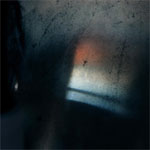
Anne Guthrie - Brass Orchids [Students of Decay - 2018] |
Anne Guthrie is a composer and instrumentalist primarily working with French horn and electronically treated field recordings. Her work has emphasised the liminal spaces between field recording, avant-garde composition and the possibilities opened up by electronic processing. She is also the current managing director of the S.E.M Ensemble in Brooklyn who specialise in performing works by modern American composers such as John Cage and Morton Feldman. Brass Orchids is Guthrie's second record for Ohio's Students of Decay label.
The opening two pieces, Bellona and Serious Water, are both murky, subterranean affairs, as if the listener was sneaking into a building through the ventilation or plumbing. Clicks and glitches are in the foreground with only the most watery, distorted glimpses of anything solid offered up through the haze. Perhaps the title of the second piece is descriptive, as at times it does seems that the composition has been produced with the effect of listening through water in mind. It's not a flat sound at all through. Despite the warped and hazy quality of the sources, the mix has considerable depth with bass tones and tuned static buzzing and chirping away at different moments, recalling some of the most abstract efforts of the likes of Valerio Tricoli and Robert Curgenven; the latter especially in Guthrie's shared interest in the use of acoustic spaces as part of the composition process. And as with Tricoli's imagined hellscapes, the prevailing feeling on Brass Orchids is one of tension and anticipated release. This occurs near the end of Serious Water when the sound of voices signal the listener's emergence from beneath the surface, and we hear what sounds like a chamber orchestra tuning up in a distant room.
If the first two tracks were beneath the surface Red Wolf is resolutely on terra firma. Industrial sounds grind and clack as what could be muffled radio recordings reminiscent of some of the passages on Thomas Koner's La Barca record enter from the margins. The muffled voice suddenly transforms into what might be an automated educational recording in a museum. This piece also features the first clear use of the French horn, which we hear overdubbed and drawn out into strange breathy tones at the edges of the mix. Bit-crushed and distorted audio artefacts are constantly flitting around adding to the uneasy sense of this studio produced environment.
Spider begins rhythmically with ping pong like sounds before digital distortion takes over the sound field. Guthrie here shows her avant-garde education with nods to the treated brass of Gordon Mumma and Robert Ashley's early hell razing experiments. But there's an inquisitive, more open approach to Guthrie's composition that never dwells too long in one place or pushes her use of noise too aggressively. So here again just when the rolling feedback and distortions begin to grate she brings in the sounds of children playing.
The final composition Glass surprises in starting with an almost clean call from Guthrie's French horn. But soon enough the tones, drones and electronic elements seep back in, covering over the familiar instrumentation with their uncanny timbres. Waves of distortion seem to emanate from the instrument as it too is drawn into the revolving melange of sound. Slowly but surely the horn frees itself from the web and in a sensitive move leaves us outdoors with the sounds of birds and familiar persons. It's a fitting way to finish off a fascinating collection of highly engaging compositions. Guthrie displays a deft touch in drawing together different strands of avant-garde styles and techniques, producing something that evokes mystery and intrigue while keeping pace with the cutting edge in her field.
      Duncan Simpson Duncan Simpson
|

